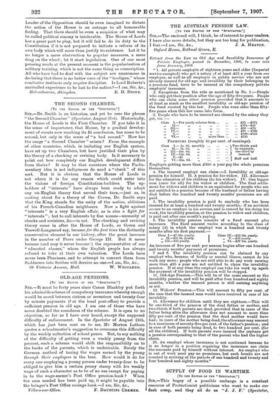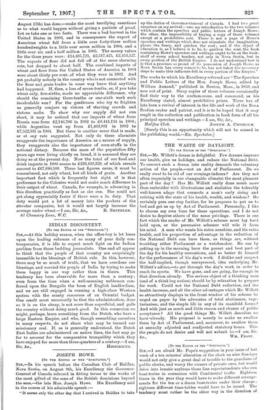SUPPLY OF FOOD IN WARTIME.
[TO THE EDITOR OF THE " SPECTATOR:]
Sr,—This bogey of a possible embargo is a constant resource of Protectionist politicians who want to make our flesh creep, and they all do as " J. F." (Spectator, August 17th) has done,—make the most terrifying assertions as to what would happen without giving a particle of proof. Let us take one or two facts. There was a bad harvest in the United States in 1903, and in consequence the export of American wheat fell from a little over forty-three million hundredweights to a little over seven million in 1904, and a little over six and a half million in 1905. The money values for the three years were : £14,495,721, £2,517,425, £2,453,527. The exports of flour did not fall off at the saute alarming rate, but dropped to about half. The combined imports of wheat and flour from the United States of America in 1904 were about thirty per cent. of what they were in 1902. And yet probably nobody in the country who is not connected with the flour and grain trades in some way knew that anything had happened. If, then, a loss of seven-tenths, or, if you take wheat only, five-sixths, made no appreciable difference, why should the remaining three-tenths or one-sixth work such incalculable woe ? For the gentlemen who try to frighten us generally conjure up visions of starving crowds and riotous mobs. To show why our supply did not run short, it may be noticed that our imports of wheat from Russia rose from £2,146,706 in 1902 to £8,444,134 in 1904; while Argentina went up from £1,463,981 in 1902 to £7,522,331 in 1904. But there is another error that is made, or at any rate suggested. Not only do these alarmists exaggerate the importance of America as a source of supply, they exaggerate also the importance of corn-stuffs in the national dietary. Because the mass of the population fifty years ago were living chiefly on bread, it is assumed they are doing so at the present day. Now the total of our food and drink imports in 1906 comes to £233,439,329, of which cereals amount to £67,880,589. These last figures cover, it must be remembered, not only wheat, but all kinds of grain. Another important fact which is frequently lost sight of is that preference to the Colonies would not make much difference to their output of wheat. Canada, for example, is advancing in this direction practically as fast as she can. She could not get along appreciably faster if there were a 5s. duty. That duty would put a lot of money into the pockets of the elevator companies, but it would not largely increase the acreage under wheat.—I am, Sir, Stc., R. SHINDLER. 61 Chancery Lane, TV. C.







































 Previous page
Previous page